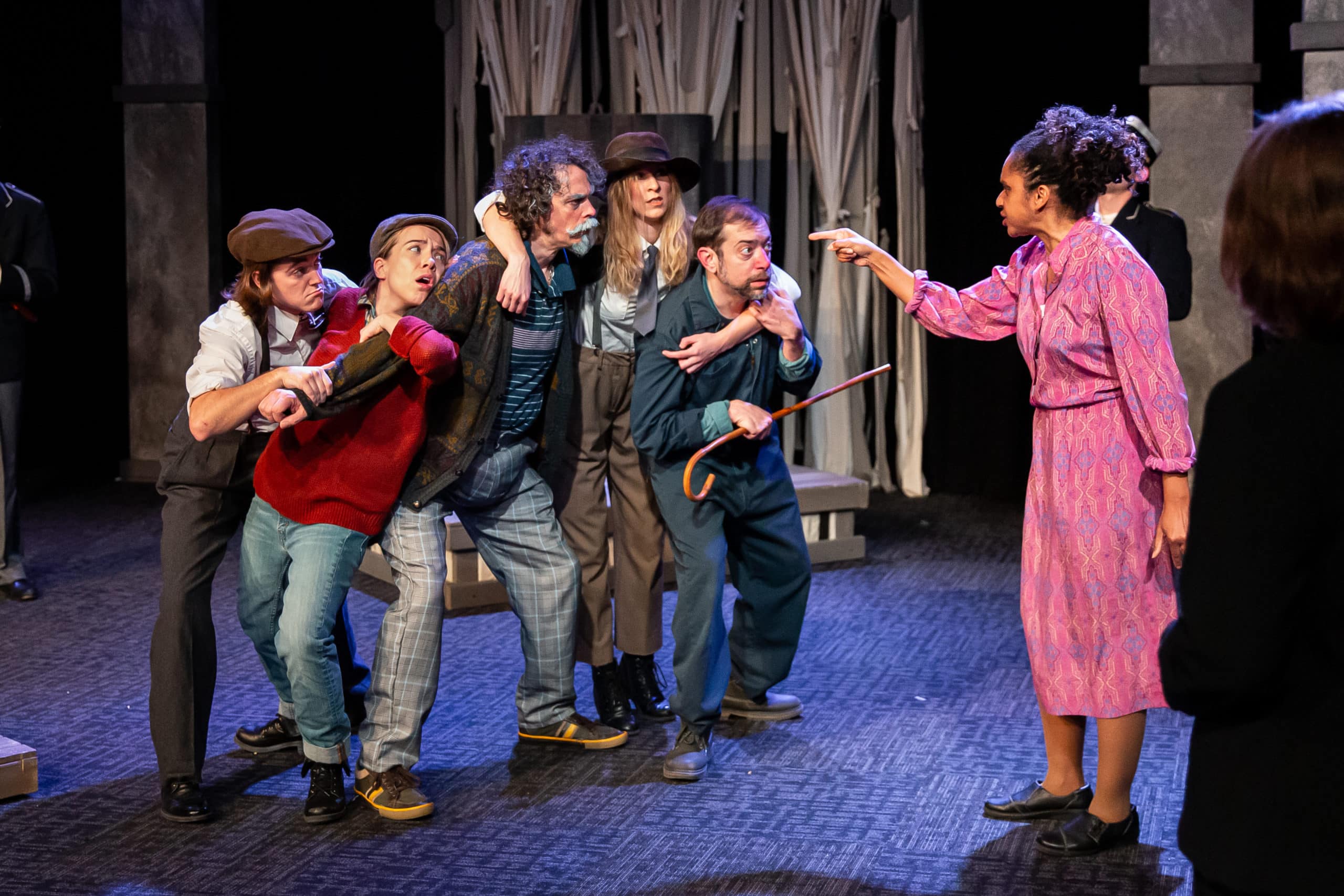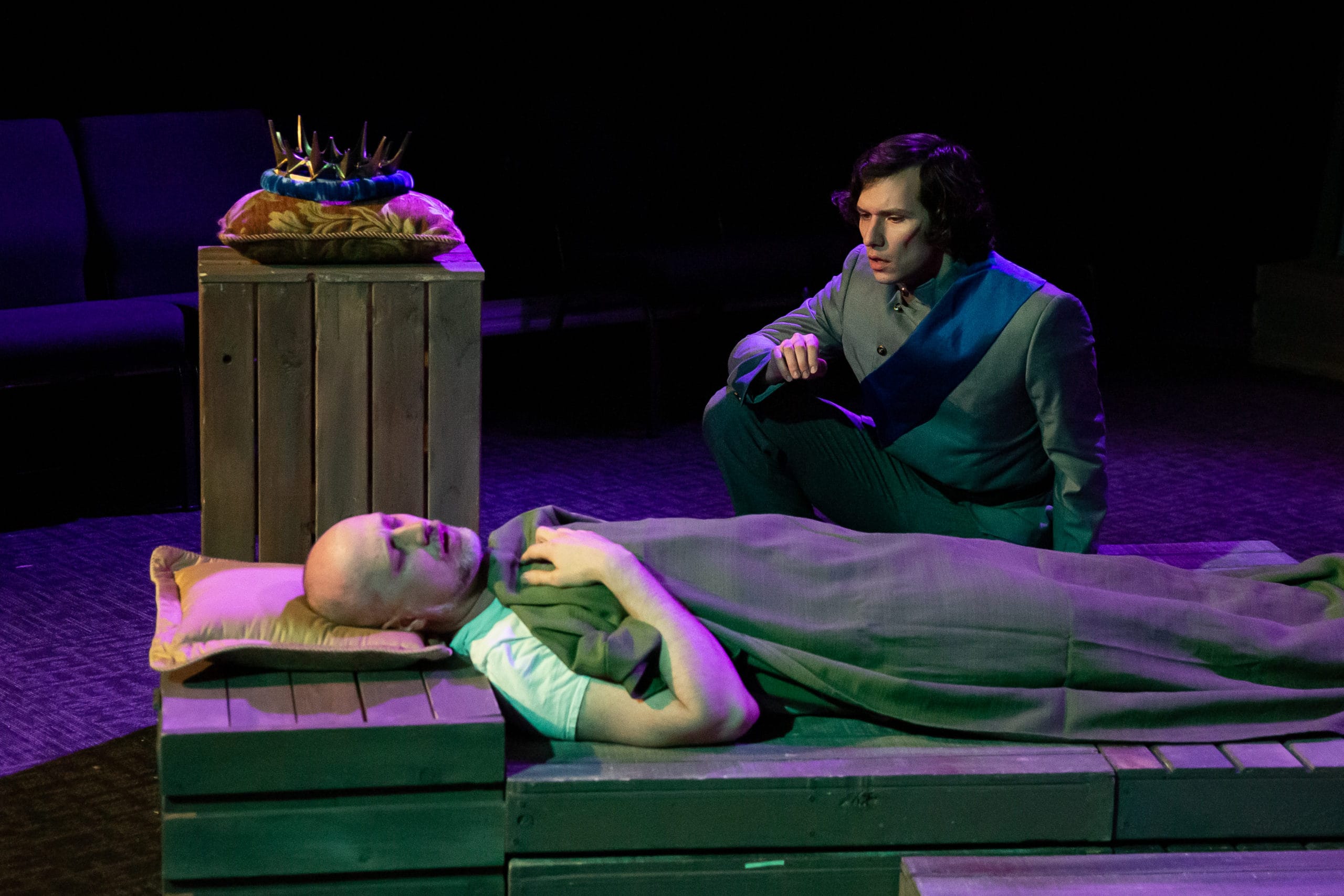The HBO hit Succession centers around a wealthy media family reportedly based on the Rupert Murdoch dynasty. Its central dilemma: who will succeed the ruthless Logan Roy as the head of his wide-ranging empire? Although the story of Henry IV, Part 2 is slightly different, the focus is much the same. Will Henry IV, ill and despondent after a brilliant youth, be able to hold onto his throne? Will his son Prince Hal stop carousing with reprobate Sir John Falstaff and become a true prince-in-waiting?

In Henry IV, Part 2, Shakespeare compresses the last decade of Henry IV’s reign into eight short historical scenes. The justly famous comic episodes with Falstaff tend to dominate many productions. Here, they are wonderfully energized by Director Charlene V. Smith’s talent for compelling stage action and exuberant physical comedy.
The introduction is usually performed by one actor who recounts the malicious power of gossip to entwine itself around the mysteries of world events. Instead, we see a number of performers whispering innuendo around the edges of the playing area. Here, Henry IV faces a rebellion.
The initial battle has gone Henry’s way. Dean Carlson as Northumberland is devastated by the news of the death of his son Hotspur at the hands of Prince Hal (Brendan Edward Kennedy). He vows to seek revenge, although at the request of his widowed daughter-in-law, Lady Kate Percy (Jillian Riti), he resolves to await the results of the latest battles in Scotland.
Kennedy’s Prince Hal has killed Hotspur, the idealist and warrior his father Henry IV (John Stange) admires, but there are still insurgents to be tamed. Scroop, Archbishop of York (the excellent Zach Brewster-Geisz) claims to have God on his side. Lady Mowbray, the Lord Marshal (Nicole Ruthmarie), Lord Bardolph (Gary DuBreuil) and Lady Hastings (Annette Mooney) fear that without Northumberland, they will be headed for disaster, as Hotspur was.
Stange’s Henry IV is supported by the Countess of Westmoreland (Riti), his sons Prince John of Lancaster (Michael Bannigan Jr.), Prince Thomas, Duke of Clarence (Carlson) and Prince Humphrey, Duke of Gloucester (DuBreuil). But he doubts the affections of the still rebellious Prince Hal. And his legitimacy is in question because he is considered responsible for the death of the rightful king, Richard II.

The versatile Lisa Hill-Corley as Travers and Tom Howley as Morton argue about what must have really happened to Hotspur, Prince Hal and the King during the previous battles.
The droll master of deception, Falstaff, as played by Ian Blackwell Rogers, introduces another relevant theme: deceitfulness and lying. Rogers’s Falstaff is highly intelligent and proud of his gargantuan wit, which is often tinged with sarcasm. His life, though morally suspect, is a triumph of imagination, and his world, chaotic as it is, remains vivid and engaging.
Fight Director Casey Kaleba’s talents enhance the comedy. There is a remarkable scene, staged by Kaleba, where the Lord Chief Justice (Mooney) along with her lieutenants Fang (Bannigan) and Snare (Riti) attempt to arrest Falstaff. A giant net ends up on various characters’ heads. At one point, all line up with Falstaff at the center, staring at their tormentors with insincere innocence.
The threat of war hangs over the raucous comic scenes. Falstaff, with his ensign Pistol (a rambunctious Stange), must muster a group of soldiers for the front; unsurprisingly, bribes are involved. The recruiting episode, one of the funniest in Shakespeare, is graced by the presence of several hapless candidates: Mouldy (Carlson), who is not happy to hear he is “ready to be used up,” the slender Shadow (an amusingly shy Caroline Johnson), Wart (DuBreuil), Feeble (Bannigan) and Bullcalf (the ubiquitous Stange).
In the countryside, where the scene occurs, Falstaff meets his old friend Justice Shallow (Tom Howley) and his colleague Silence (Lisa Hill-Corley). Howley and Rogers are delightfully funny as they reminisce about their “wild” youth.
Kennedy gives a strong performance as Prince Hal. When we first see him, he is joking around with his fellow layabout Ned Poins (Bannigan). Kennedy excels in the difficult transition from black sheep to future king. His reconciliation scene with Stange’s Henry IV is touching.
Mistress Quickly (Hill-Corley) believes Falstaff will marry her as he continues to borrow money from her. To make it even more confusing, Quickly is besties with prostitute Doll Tearsheet (the amazingly athletic Riti), who is Falstaff’s favorite. Falstaff treats them both badly and they are in some ways rivals. Yet, strangely, there is no jealousy between them; both continue to adore him.
Bardolph (Brewster-Geisz), Peto (Brianna Goode), and Frances (Ruthmarie) perform with skill in all their scenes. Caroline Johnson is angelically patient as Davy.
The use of females adds a distinctive new tone to the proceedings. There are female authority figures (the Countess of Westmoreland, the Lord Chief Justice), rebels (Lady Hastings and Lady Mowbray), and even a Lady Coleville (Brianna Goode), Falstaff’s all-too-willing prisoner.
The costumes by Kristen P Ahern are a pleasing mixture of classical and contemporary themes. Pistol wears a fetching pair of goggles, like a WW II pilot. The unusually slim Falstaff wears patterns that don’t match. The quasi-military uniforms work well, too.
Lighting by Jason Aufdem-Brinke and set by Megan Holden are suitable and attractive. Associate Director/Music Director/Composer Jordan Friend and Fight Director Casey Kaleba deserve special mention.
With fine performances by Falstaff, Prince Hal, and Henry IV, surrounded by an accomplished ensemble, this Henry IV Part 2 is well worth seeing. Smith’s direction and the talents of all concerned make this a fun and thought-provoking evening.
Running Time: Two hours and 30 minutes, plus one 15-minute intermission.
Henry IV, Part 2 plays through April 19, 2020, at Brave Spirits Theatre, 1819 N. Quaker Lane Alexandria, Virginia. Purchase tickets online.
The text was edited March 7, 2020, to correctly credit Fight Director Casey Kaleba.
Note: Over the 2020 and 2021 seasons, Brave Spirits Theatre is making history by becoming the first professional American theatre company to mount full productions of Shakespeare’s two history tetralogies and perform them in repertory. Learn more here.
[Related: Read David Siegel’s interview with Brave Spirits Artistic Director Charlene V. Smith here.]




